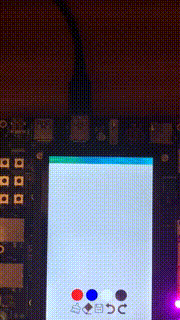
介绍
这是一个绘画板,我们可以实现简单的绘画,功能包括:画笔颜色切换、清空、橡皮擦、保存、撤回、反撤回
效果展示

原理分析
1、线条生成
这是最基础的功能,具体实现方法,前面的文章也介绍过。
首先,我们需要将canvas上下文对象,需要在触摸移动事件中绑定,因为我们是通过触摸来生成对应线条的。
然后,定义两个数组,分别存储鼠标经过的x与y坐标,在鼠标按下时开始记录,在鼠标移动时,也将坐标push到数组中。
最后,将获取的坐标通过绘画方法,通过moveTo和lineTo进行绘画,即可得到线条。
// 绘画函数
lineDraw(e){
this.ctx.lineWidth = this.lineWidth
this.ctx.strokeStyle = this.strokeStyle
this.ctx.beginPath()
// 向线条的每个末端添加圆形线帽。
this.ctx.lineCap ='round'
// 每次将数组中最后一个值取出,作为起始点
this.ctx.moveTo(this.ArrX[this.ArrX.length-1],this.ArrY[this.ArrY.length-1])
this.ctx.lineTo(e.touches[0].localX,e.touches[0].localY)
this.ctx.stroke()
}
2、清空画板
清空画布的功能最简单,调用canvasAPI的ctx.clearRect即可。
API介绍:clearRect(x: number, y: number, w: number, h: number): void。
- x:指定矩形上的左上角x坐标。
- y:指定矩形上的左上角y坐标。
- width:指定矩形的宽度。
- height:指定矩形的高度。
这里因为是清空,所以只需要将在坐标设置为左上角,然后宽高设置为和当前canvs画布宽高一致即可清空画板。
// width和height为获取的canvas宽高
clearBtn(e){
this.ctx.clearRect(0, 0, this.width, this.height);
}
3、橡皮擦
这里的实现实际和清空画板一样,只是橡皮擦清空的面积小很多。
首先,定义一个标识,来判断是否需要橡皮擦功能,用户通过点击下面的橡皮擦图片进行控制。
然后,我们需要在触摸移动事件,提前判断是否需要橡皮擦功能,如果需要,我们将画线功能替换为橡皮擦功能,功能实现的API和清空画板一样。
最后,就是橡皮擦大小的问题,我们可以提前定义一个属性,用来控制大小,在橡皮擦功能中,将该属性添加即可。
touchmove(e){
if(this.isEraser){
this.ctx.clearRect(this.ArrX[this.ArrX.length-1]-this.eraserValue,this.ArrY[this.ArrY.length-1]-this.eraserValue,this.eraserValue,this.eraserValue)
}else{
this.lineDraw(e)
}
this.ArrX.push(e.touches[0].localX)
this.ArrY.push(e.touches[0].localY)
}
4、保存绘画
这里还没实现出来。
这里利用了canvas的一个API:toDataURL(type?: string, quality?:number)。
可以生成一个包含图片展示的URL。
参数:
- type: 可选参数,用于指定图像格式,默认格式为image/png、。
- quality:在指定图片格式为image/jpeg或image/webp的情况下,可以从0到1的区间内选择图片的质量。如果超出取值范围,将会使用默认值0.92。
返回值:
- string:图像的URL地址。
我们可以通过toDataURL将获取到的图像的URL地址进行存储,在需要的地方生成canvas图像即可。
saveBtn(){
const el = this.$refs.canvas;
const dataURL = el.toDataURL();
console.log(dataURL);
}
5、撤回
撤回功能用到的API比较多,需要耐心的阅读文档。
在实现撤回功能之前,我们需要将每次绘画出来的线条进行存储,在鼠标抬起事件中,通过toDataURL()将获取到当前的图像,push到数组中,存储起来。
实现撤回功能:
首先,需要一个属性:步频,我们每次绘画一条线段,step就自增,撤回功能中,只需要将当前步频-1,就能拿到上一次绘画的图像。
然后,将当前的图像清空,通过clearRect。
最后,拿到上一次的图像,通过onload函数,将图像进行绘画,通过drawImage实现绘画功能。
6、反撤回
反撤回的实现基本上和撤回一样,只不过获取的图像不同。
和撤回一样,需要拿到每次的图像,这里可以直接利用撤回中获取的图像。
实现反撤回功能:
首先,每次反撤回,需要将步频++,我们就可以拿到当前显示画像的前一张画画像。
然后,将当前的图像清空,通过clearRect。
最后,拿到上一次的图像,通过onload函数,将图像进行绘画,通过drawImage实现绘画功能。
7、线条样式
线条颜色实现比较简单,当用户点击需要的颜色样式时,修改画布的ctx.strokeStyle即可。
完整代码
index.js:
// @ts-nocheck
export default {
data: {
ctx:'',
width:0,
height:0,
ArrX:[],
ArrY:[],
lineWidth:14,
isEraser:false,//是否开启橡皮擦功能
eraserValue:30,//橡皮擦大小
strokeStyle:'black',
canvasHistory:[],
step:-1,
showClear:true,
showEraser:true,
showSave:true,
showUndo:true,
showRedo:true
},
onLayoutReady(){
const el = this.$refs.canvas;
this.ctx = el.getContext('2d')
this.width = el.getBoundingClientRect().width;
this.height = el.getBoundingClientRect().height;
},
// 偏移很多
touchstart(e){
this.ArrX.push(e.touches[0].localX)
this.ArrY.push(e.touches[0].localY)
if(this.isEraser){
this.ctx.clearRect(e.touches[0].localX-this.eraserValue,e.touches[0].localY-this.eraserValue,this.eraserValue,this.eraserValue)
}
},
touchmove(e){
if(this.isEraser){
this.ctx.clearRect(this.ArrX[this.ArrX.length-1]-this.eraserValue,this.ArrY[this.ArrY.length-1]-this.eraserValue,this.eraserValue,this.eraserValue)
}else{
this.lineDraw(e)
}
this.ArrX.push(e.touches[0].localX)
this.ArrY.push(e.touches[0].localY)
},
lineDraw(e){
this.ctx.lineWidth = this.lineWidth
this.ctx.strokeStyle = this.strokeStyle
this.ctx.beginPath()
// 向线条的每个末端添加圆形线帽。
this.ctx.lineCap ='round'
// 每次将数组中最后一个值取出,作为起始点
this.ctx.moveTo(this.ArrX[this.ArrX.length-1],this.ArrY[this.ArrY.length-1])
this.ctx.lineTo(e.touches[0].localX,e.touches[0].localY)
this.ctx.stroke()
},
touchend(e){
const el = this.$refs.canvas;
this.step++;
this.canvasHistory.push(el.toDataURL()); // 添加新的绘制到历史记录
console.log(this.step)
},
saveBtn(){
const el = this.$refs.canvas;
const dataURL = el.toDataURL();
console.log(dataURL);
},
withdraw(){
this.ArrX.pop()
this.ArrY.pop()
},
clearBtn(e){
this.ctx.clearRect(0, 0, this.width, this.height);
this.showClear = false
this.showEraser=true
this.showSave=true
this.showUndo=true
this.showRedo=true
},
clearBtnEnd(){
this.showClear = true
},
EraserBtn(){
this.isEraser = !this.isEraser
this.showClear = true
this.showEraser=!this.showEraser
this.showSave=true
this.showUndo=true
this.showRedo=true
},
saveBtn(){
this.showClear = true
this.showEraser=true
this.showSave=false
this.showUndo=true
this.showRedo=true
},
saveBtnEnd(){
this.showClear = true
this.showEraser=true
this.showSave=true
this.showUndo=true
this.showRedo=true
},
red(){
this.strokeStyle = 'red'
},
blue(){
this.strokeStyle = 'blue'
},
white(){
this.strokeStyle = 'white'
},
black(){
this.strokeStyle = 'black'
},
undo(){
if (this.step >= 0) {
this.step--;
this.ctx.clearRect(0, 0, this.width, this.height);
let img = new Image();
img.src = this.canvasHistory[this.step];
let that = this
img.onload = function() {
// 画上图片
that.ctx.drawImage(canvasPic, 0, 0);
};
} else {
console.log('不能再继续撤销了');
}
this.showClear = true
this.showEraser=true
this.showSave=true
this.showUndo=false
this.showRedo=true
},
undoEnd(){
this.showClear = true
this.showEraser=true
this.showSave=true
this.showUndo=true
this.showRedo=true
},
redo(){
if (this.step < this.canvasHistory.length - 1) {
this.step++;
let img = new Image();
img.src = this.canvasHistory[this.step];
let that = this
img.onload = function() {
that.ctx.clearRect(0, 0, this.width, this.height);
that.ctx.drawImage(canvasPic, 0, 0);
};
} else {
console.log('已经是最新的记录了');
}
this.showClear = true
this.showEraser=true
this.showSave=true
this.showUndo=true
this.showRedo=false
},
redoEnd(){
this.showClear = true
this.showEraser=true
this.showSave=true
this.showUndo=true
this.showRedo=true
}
}
总结
不足点:
- 保存功能还没完全完成。
- 绘制的曲线并不是很好看,优化方案:添加贝赛尔曲线。
贝赛尔曲线是用来绘制曲线的,一般的矢量图形软件通过它来精确画出曲线。
最后,这个canvasAPI实在有点多,需要耐心点看,在读OpenHarmony官方文档时,还发现两处问题,提了两个issure。
文章相关附件可以点击下面的原文链接前往下载:
https://ost.51cto.com/resource/2231。





































